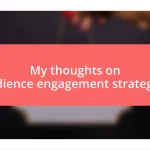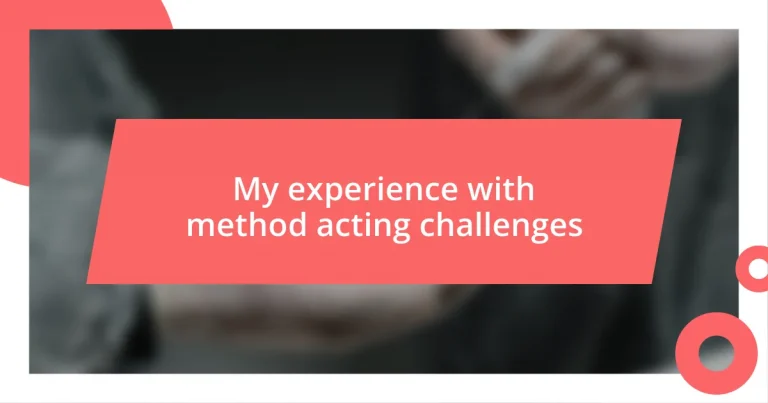Key takeaways:
- Method acting emphasizes emotional authenticity, encouraging actors to use personal experiences for deeper character portrayal.
- Common challenges include emotional exhaustion from character immersion and managing performance anxiety; grounding techniques and emotional boundaries are essential for coping.
- Personal growth through method acting involves self-discovery, recognizing strengths, and celebrating small victories as part of the evolving artistic journey.
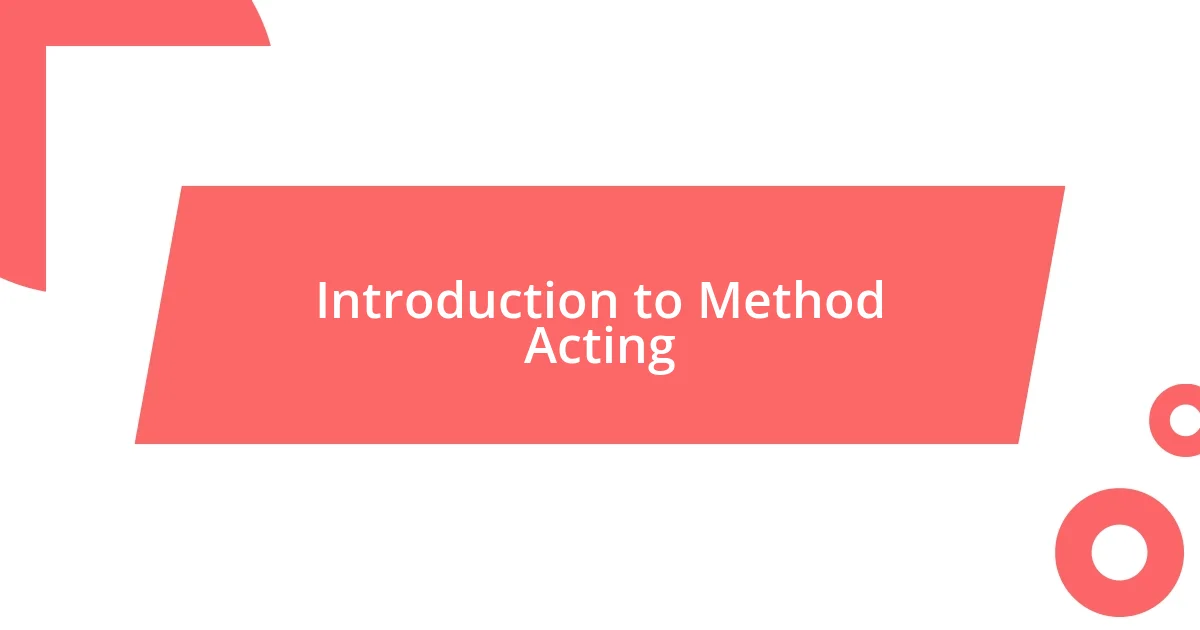
Introduction to Method Acting
Method acting, a technique rooted in emotional truth and authenticity, goes beyond merely memorizing lines. I remember the first time I truly immersed myself in a character; it felt like stepping into a different skin, leaving my own identity behind. Have you ever wondered how actors can evoke such raw emotions on screen?
This approach, championed by influential figures like Lee Strasberg, encourages actors to tap into their own experiences and emotions to bring characters to life. I distinctly recall a rehearsal where I struggled to connect with a character’s grief; it was only by recalling a personal loss that the tears came, making the performance genuinely powerful. It’s fascinating to think about how our own lives can enrich our portrayals.
The process of method acting can be both exhilarating and daunting. There are moments when I’ve felt completely vulnerable, exposing my innermost feelings to an audience. How often do we allow ourselves that level of openness in life? Engaging with method acting invites an exploration of not just the characters we portray, but also ourselves.
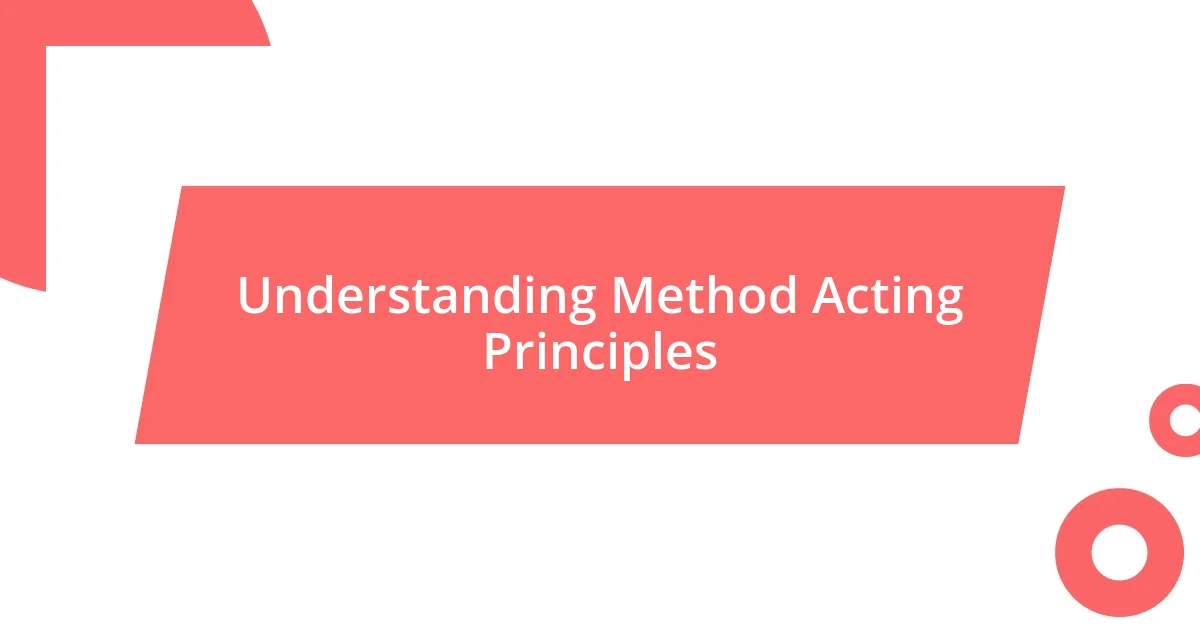
Understanding Method Acting Principles
Understanding the principles of method acting is essential for anyone looking to deepen their craft. This technique emphasizes emotional recall, allowing actors to draw from personal life experiences to embody their characters fully. I still remember performing a scene after drawing on my childhood fears; the vulnerability made my portrayal resonate authentically with the audience.
Key principles of method acting include:
- Emotional Memory: Retrieving personal emotions and memories to connect with the character’s feelings.
- Sense Memory: Utilizing physical sensations to evoke the character’s experience, such as recalling the feel of rain on skin for a specific scene.
- Relaxation Techniques: Finding mental and physical calm to enable a deeper connection with the role.
- Improvisation: Allowing for spontaneous moments that can lead to genuine emotional responses, something I find invigorating yet challenging.
Every time I engage with these principles, I confront elements of my past, which can be both rewarding and unsettling. There’s beauty in that journey, as it not only shapes my acting but also fosters a deeper understanding of myself.

Identifying Common Challenges
Identifying the common challenges of method acting can be quite revealing, both for new and experienced actors. One of the hurdles I faced early on was immersing myself too deeply into my character. There were times when I couldn’t discern where I ended and the character began. This blurring of lines can lead to emotional exhaustion, leaving me drained after performances. Have you ever felt affected by a role long after stepping off stage?
Another challenge lies in mastering emotional recall. There were instances when dredging up memories felt like opening old wounds. While that process can be cathartic, it can also bring to the surface feelings that are tough to manage. I recall a scene where I needed to portray heartbreak, and as soon as I called back a painful breakup, I felt overwhelmed. It made the performance authentic, but the emotional hangover was real!
Also, the pressure to continuously deliver emotionally charged performances can create anxiety. The fear of not meeting expectations, whether personal or from an audience, can be daunting. I often remind myself that it’s part of the journey, and embracing these vulnerabilities opens the door to genuine artistry.
| Challenge | Description |
|---|---|
| Emotional Exhaustion | Difficulty in separating personal emotions from character emotions, leading to feelings of fatigue. |
| Emotional Recall | Struggling to tap into past experiences, which can reopen old emotional wounds. |
| Performance Anxiety | The pressure to deliver authentic performances, contributing to stress and self-doubt. |
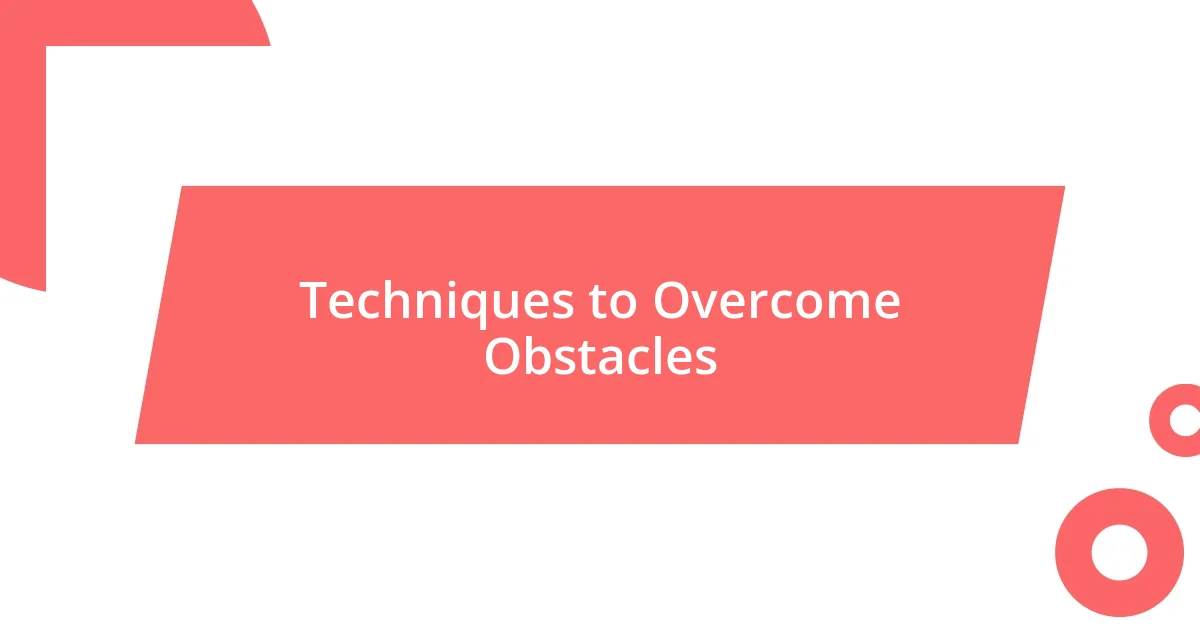
Techniques to Overcome Obstacles
When facing emotional exhaustion, I’ve found that grounding techniques can truly be a lifesaver. Before stepping on stage, I often take a few moments to practice deep breathing or visualization. Each breath in feels like a wave of calm washing over me, while visualizing a safe space helps me reconnect with myself. Have you ever tried something similar? It really brings me back to my center.
Mastering emotional recall can be like walking a tightrope; it’s essential yet precarious. I learned that journaling my thoughts and feelings after particularly intense scenes can help process what I’ve just experienced. Reflecting on those moments not only aids in releasing emotions but reinforces my connection to the character in future performances. It’s almost like having a conversation with myself about the role; I can ask, “What did I learn from this?”
To combat performance anxiety, I’ve integrated positive affirmations into my routine. Each time I face the audience, I repeat phrases like “I am prepared” and “I trust my instincts.” This practice was born out of countless nerve-wracking experiences where fear almost overshadowed my passion. Embracing the jitters instead of letting them control me has transformed my performances into genuine expressions of art. What affirmations do you find resonate with you?
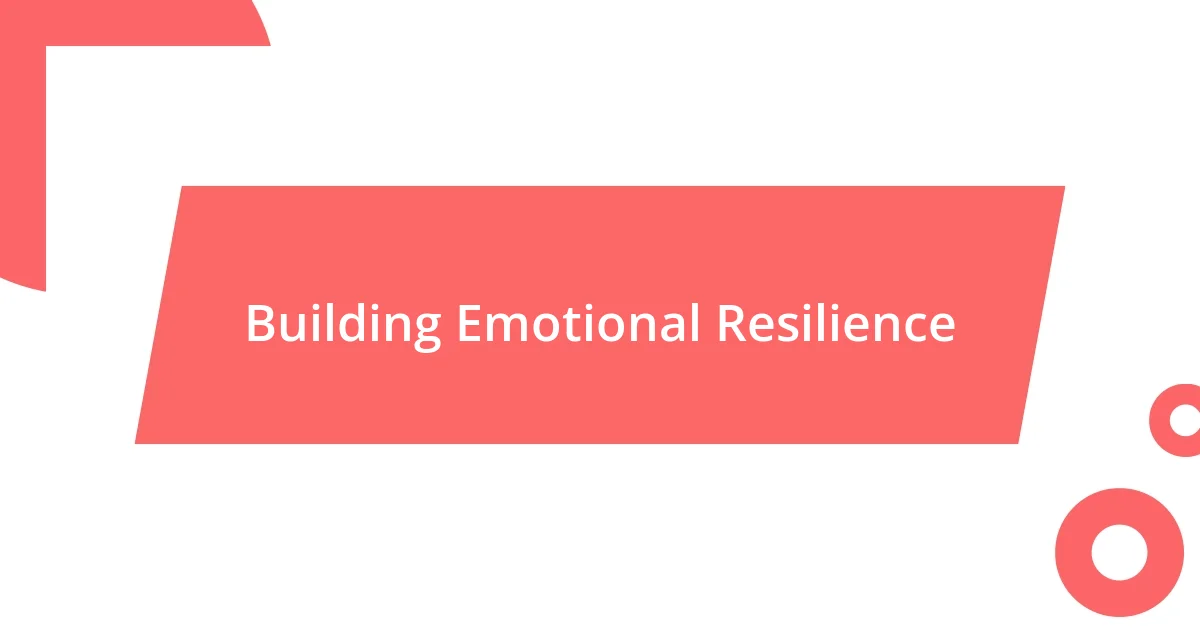
Building Emotional Resilience
Building emotional resilience is a journey that I’ve embarked on through method acting, and it’s not always easy. I’ve learned that acknowledging my feelings, especially the tough ones, is crucial. There was a significant moment when a scene felt overwhelming, but instead of shying away, I leaned into that discomfort. Do you remember a time when leaning into an emotion transformed your experience?
One thing I’ve found incredibly helpful is creating emotional boundaries. After an intense performance, I make it a point to take a step back and have some quiet time. I cherish those moments of solitude. They allow me to decompress and reflect on what I’ve gone through. On one occasion, after portraying a deeply troubled character, I locked myself in my room with a journal and just wrote. That practice became a sanctuary where I could sift through my emotions in a safe space. Isn’t it amazing how pouring feelings onto paper can lighten the emotional load?
Another aspect of building emotional resilience for me has been cultivating a support network. Surrounding myself with fellow actors who understand the challenges has made a vast difference. We often share our experiences over coffee, discussing not only our triumphs but also our struggles. It’s in those conversations that I realized I wasn’t alone in navigating these emotional waters. Have you ever felt the power of shared experiences in your own life?
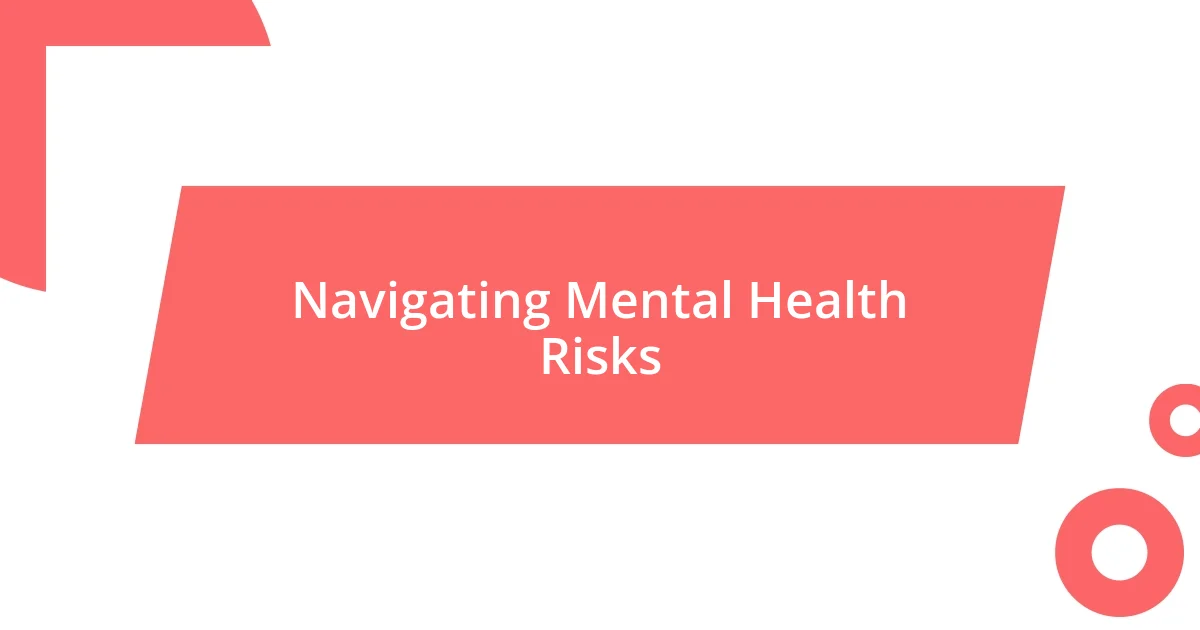
Navigating Mental Health Risks
Navigating the mental health risks that come with method acting has been a delicate balancing act for me. There have been times when I immersed myself so deeply in a character that I struggled to separate my own feelings from theirs. For instance, after living as a character grappling with grief, I found myself unexpectedly teary-eyed for days. Have you ever wondered how much a role can influence your emotions long after the curtain falls?
One strategy I’ve adopted is setting firm emotional limits. I realized that if I remain in the character’s mindset for too long, it can lead to emotional fatigue. After portraying a villain, I made it a habit to walk in nature, allowing the fresh air to clear my mind. This transition helped create a barrier between the character’s turmoil and my everyday life. How do you create space for yourself after emotionally charged experiences?
Engaging in regular self-check-ins has been another crucial element of my journey. I often pause to ask myself how I’m feeling, whether it’s confusion, sadness, or even exhilaration. By acknowledging these emotions, I can process them constructively rather than letting them fester. I recall a moment when journal entries became my lifeline, guiding me out of a foggy mental state. Isn’t it empowering to take control of your emotions and understand their impact on your psyche?
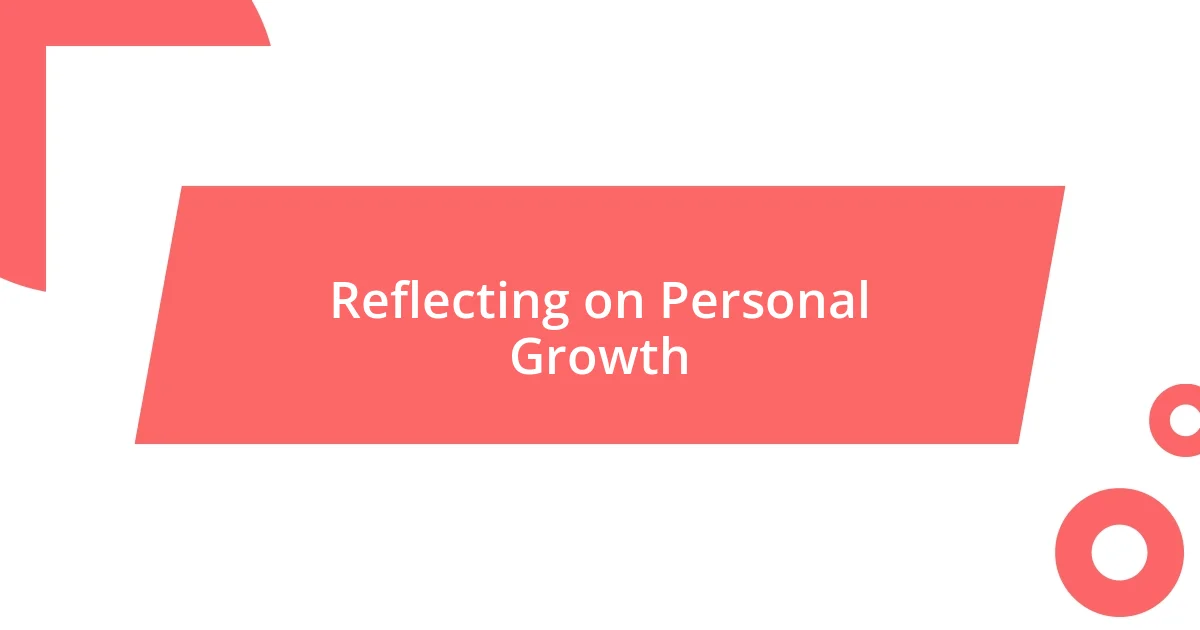
Reflecting on Personal Growth
Reflecting on my personal growth through method acting has revealed just how much I’ve evolved as an individual. One striking moment came after I stepped off stage feeling utterly exposed from an intense performance. I remember standing in front of the mirror, looking at myself and realizing that while the character might be gone, the experience had left behind a deeper understanding of my own vulnerabilities. Have you ever experienced a moment of self-discovery that shifted your perspective?
I often find that this journey is filled with unexpected revelations about my strengths and weaknesses. There was an instance where I challenged myself to portray a character who represented everything I wasn’t—a confident, brash leader. In immersing myself in that role, I uncovered reservoirs of courage I never knew existed within me. It made me question: how often do we underestimate our capacity for growth when faced with challenges?
Celebrating small victories has also become an integral part of my growth process. I remember the exhilarating feeling of nailing a particularly intricate scene that once felt unattainable. Each success reminds me that growth isn’t just about the big milestones; it’s about those little moments that build toward something profound. Doesn’t it feel incredibly satisfying to recognize your progress, even in the tiniest increments?








